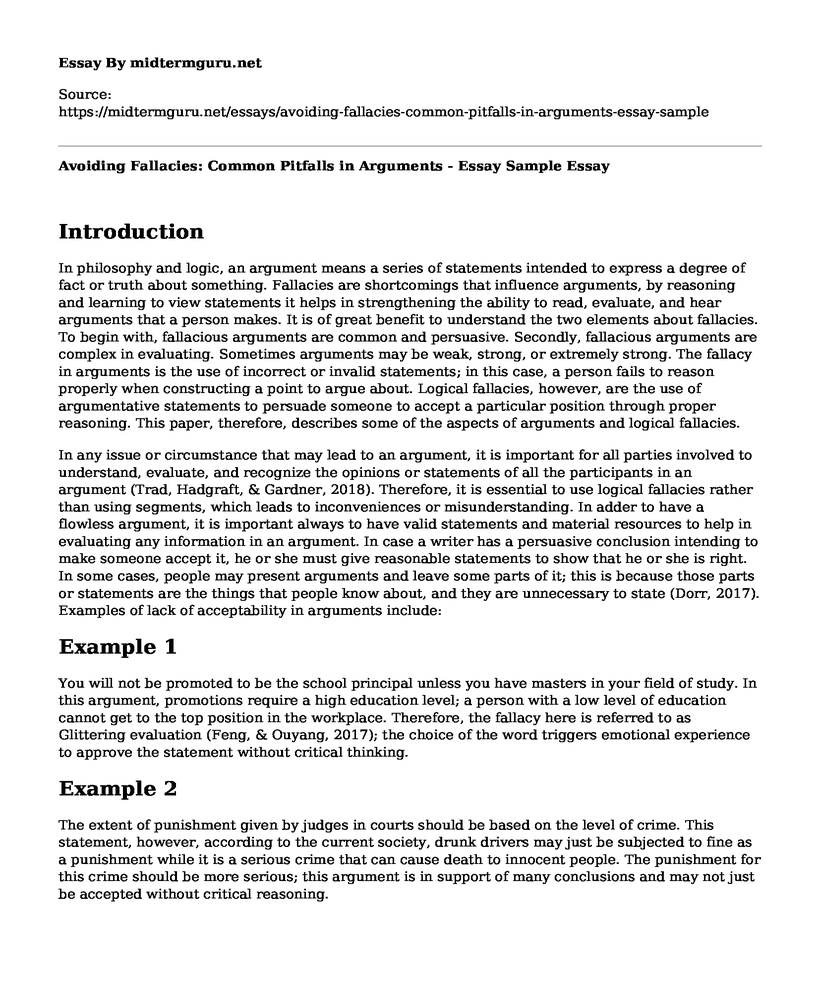Introduction
In philosophy and logic, an argument means a series of statements intended to express a degree of fact or truth about something. Fallacies are shortcomings that influence arguments, by reasoning and learning to view statements it helps in strengthening the ability to read, evaluate, and hear arguments that a person makes. It is of great benefit to understand the two elements about fallacies. To begin with, fallacious arguments are common and persuasive. Secondly, fallacious arguments are complex in evaluating. Sometimes arguments may be weak, strong, or extremely strong. The fallacy in arguments is the use of incorrect or invalid statements; in this case, a person fails to reason properly when constructing a point to argue about. Logical fallacies, however, are the use of argumentative statements to persuade someone to accept a particular position through proper reasoning. This paper, therefore, describes some of the aspects of arguments and logical fallacies.
In any issue or circumstance that may lead to an argument, it is important for all parties involved to understand, evaluate, and recognize the opinions or statements of all the participants in an argument (Trad, Hadgraft, & Gardner, 2018). Therefore, it is essential to use logical fallacies rather than using segments, which leads to inconveniences or misunderstanding. In adder to have a flowless argument, it is important always to have valid statements and material resources to help in evaluating any information in an argument. In case a writer has a persuasive conclusion intending to make someone accept it, he or she must give reasonable statements to show that he or she is right. In some cases, people may present arguments and leave some parts of it; this is because those parts or statements are the things that people know about, and they are unnecessary to state (Dorr, 2017). Examples of lack of acceptability in arguments include:
Example 1
You will not be promoted to be the school principal unless you have masters in your field of study. In this argument, promotions require a high education level; a person with a low level of education cannot get to the top position in the workplace. Therefore, the fallacy here is referred to as Glittering evaluation (Feng, & Ouyang, 2017); the choice of the word triggers emotional experience to approve the statement without critical thinking.
Example 2
The extent of punishment given by judges in courts should be based on the level of crime. This statement, however, according to the current society, drunk drivers may just be subjected to fine as a punishment while it is a serious crime that can cause death to innocent people. The punishment for this crime should be more serious; this argument is in support of many conclusions and may not just be accepted without critical reasoning.
Example 3
The government raised taxes, and as a result, there was a rise in violent crime. Therefore, the government is responsible for the situation. In this argument, the rise in taxes may he or not be the core factor leading to a rise in crime. The statement has not presented any point showing how one cased the other.
References
Dorr, A. (2017). Common errors in reasoning about the future: Three informal fallacies. Technological Forecasting and Social Change, 116, 322-330.
Feng, H. W., & Ouyang, W. M. (2017, February). Review on An Article of Life Lying in Sport is Misleading from Critical Thinking Perspective. In 2017 2nd International Conference on Humanities and Social Science (HSS 2017). Atlantis Press.
Trad, S., Hadgraft, R., & Gardner, A. (2018). Sustainability invisibility: moving beyond technical rationality.
Cite this page
Avoiding Fallacies: Common Pitfalls in Arguments - Essay Sample. (2023, Jan 29). Retrieved from https://midtermguru.com/essays/avoiding-fallacies-common-pitfalls-in-arguments-essay-sample
If you are the original author of this essay and no longer wish to have it published on the midtermguru.com website, please click below to request its removal:
- Essay Sample on Productive Businesses Priorities
- Paradox of Inquiry - Paper Example
- The Crito by Plato - Essay Sample
- Ethical Principles for Improving Management & Service Delivery in Healthcare - Essay Sample
- Article Analysis Essay on Homosexuality and the PIB Argument
- My Code of Ethics: Golden Rule & Brazen/Iron Rules - Research Paper
- Workplace Ethics Violations: Case Study







